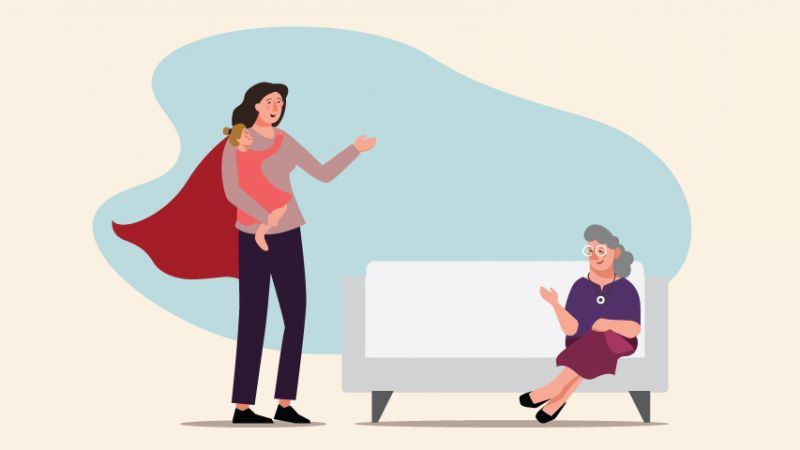Caregivers, you are superheroes—the ones who do it all, no questions asked. The energy you expend to your loved ones is energy you deserve to invest back into yourself. With November being National Family Caregivers Month, now is the time to relax and recharge
In 2020 especially, the glory of being needed bears a draining price. Many caregivers are experiencing the taxing combination of caregiving, working from home, childcare duties, and the fear of contracting the coronavirus—all at the same time. A Medical Guardian study reports that—despite many family caregivers feeling busier than ever—31 percent feel lonely right now and 47 percent feel socially isolated as a result of social distancing.
Now is the time to step back and ask the questions: How are you caring for your physical and mental wellbeing? When can you make time to unplug? What resources can you add to your daily toolkit? As caregivers, you put others’ needs above your own. It’s time to return the favor to yourself, and there are plenty of ways to start.
Slow down the mind
The constant intake of news—especially in a pandemic—overloads the mind and increases the body’s stress levels. Unplugging from your phone, email, and the news cycle is difficult to do, but necessary for overall health.
Breathing exercises are a good way to relax, reduce tension, and relieve stress. Different techniques work for different people, so try out 4-7-8 breathing, roll breathing, and morning breathing to find your preference. Sitting in silence with eyes-closed is a great option, but meditation apps like Headspace, Calm, and Simple Habit can add an extra level of comfort and guidance. Consider adding gratitude as part of your meditation and breathing practice, as researchers at Harvard suggest giving thanks welcomes a greater sense of wellbeing and happiness.
Move your body
It may seem counterintuitive, but moving your body is just as important as welcoming stillness. A 2020 study found that spending as little as 10 minutes outside—especially in nature—can improve mood, focus, heart rate, and blood pressure. Grab your mask, sneakers, and a water bottle, and head outside for a brisk walk or run. If your comfort level isn’t quite there yet, try walking around your porch, driveway, lawn, or anywhere else you feel safe in fresh air.
If you prefer to stay inside, consider taking virtual cycling classes with Peloton, purchasing free weights for at-home strength training, or following an online yoga class. Remember, you don’t have to spend hours a day moving your body to achieve the stress-relieving benefits of exercise. A simple 5-minute yoga flow or a short walk will do the trick.
Create a routine
Though routines can feel dull on the surface, research shows they improve stress levels, sleep, and overall health. Dr. Steve Orma—a CBT clinical psychologist who specializes in treating insomnia, anxiety, and stress—recommends adding regular, mundane tasks to your daily list like chores, paying bills, and running errands. Orma suggests, “Once these tasks become your normal routine, it’s easier to accomplish everything, because it becomes habit.”
A few ways you can create a routine are: waking up and going to sleep at similar times every day, keeping up with personal hygiene, eating healthy meals at regular times, exercising regularly, allocating time for work and rest, and making time for activities you enjoy. If your current routine isn’t working, try swapping out different activities until you find the optimal schedule for your lifestyle.
Balance your screen time
In quarantine, keeping regular contact with loved ones is a great way to reduce feelings of loneliness and anxiety. Maybe this looks like a once-a-week Zoom call or a daily 5-minute phone conversation—you know what works best for you.
While calling loved ones offers relief, take note of what on-screen activities cause distress. Checking emails and staying up-to-date on the latest news is important, but too much screen time wreaks havoc on the body and mind, causing strained eyes, blurred vision, headaches, poor posture, and a compromised sleep cycle.
To find a solid balance, try turning off notifications from any apps or contacts that are not essential to your daily routine. Go one step further and delete any time-sucking apps off your phone that do not promote any physical or mental health benefit. Supplement your on-screen activities for off-screen ones like painting, reading, walking, and biking. Ultimately, it’s up to you to decide what designates “too much” on-screen time.
Bottom line: go easy on yourself
There is no guidebook or perfect answer to being a caregiver in 2020. You are handling this year in the best way possible, but it never hurts to add more resources to your toolkit.
Purchasing a medical alert system can offer comfort when you are away from your loved one. Consider an at-home medical alert system with a wearable emergency button, or a portable device with an unlimited range of coverage, that alerts you when a loved one is in danger. This way, you can ensure your loved one remains safe during and after this holiday season.

